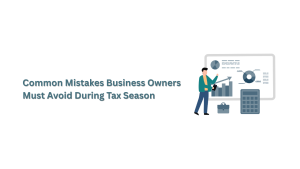Tax season often feels like a formidable beast for many business owners. You’re already juggling so much, aren’t you? Between managing daily operations, chasing new leads, and driving growth, the intricate world of Tax Preparation can quickly become overwhelming. It’s a common struggle, and you’re not alone in feeling that pressure.
Many entrepreneurs find themselves lost in a labyrinth of changing regulations, worried about making a costly mistake. You might be spending countless hours sifting through receipts or struggling to understand what deductions you can actually claim. Perhaps you’ve even had a sleepless night or two dreading that April deadline. This guide is your complete roadmap.
It’s designed to equip you with clear, actionable strategies. You’ll discover how to navigate tax season with confidence.
We’ll help you avoid common pitfalls. More importantly, you’ll uncover opportunities to save money and free up valuable time. You’re about to learn how to transform tax season from a dreaded chore into a manageable process.
The Crucial Role of Proactive Tax Preparation for Your Business
Thinking ahead when it comes to your taxes isn’t just about ticking off a box on a calendar. It’s a foundational strategy for any thriving business. Being proactive with your Tax Preparation can significantly impact your financial health and overall peace of mind. You’re essentially setting yourself up for success, long before tax day even looms large.
- Minimizing penalties and avoiding unnecessary costs.
- Potential savings through strategic planning.
- Improving cash flow and financial stability.
- Reducing stress and gaining peace of mind.
- Setting the stage for future business growth.
Common Mistakes Business Owners Must Avoid During Tax Season

Even with the best intentions, it’s easy for business owners to stumble during tax season. The path to smooth Tax Preparation is often fraught with common pitfalls. Many of these mistakes can lead to unnecessary stress, missed opportunities, and even costly penalties. It truly pays to be aware of where others often go wrong. You don’t want to learn these lessons the hard way, do you?
Let’s unpack the most frequent missteps, so you can steer clear of them entirely.
Neglecting Proper Record-Keeping from Day One
You might think, “I’ll sort out all those receipts later.” That’s a common trap many entrepreneurs fall into. Poor bookkeeping, however, is a direct route to lost deductions and incomplete filings. It also makes you a prime candidate for an audit. Well-organized records, kept meticulously from the very beginning, are your best friend. They simplify the entire process. They provide indisputable proof of your transactions. Imagine trying to find a needle in a haystack – that’s what it feels like sifting through a year’s worth of unorganized papers. It’s far better to have a system in place that keeps everything tidy.
Mixing Personal and Business Finances
This is a classic rookie error that can haunt even seasoned business owners. Running your business finances through your personal accounts might seem convenient at first. But it creates a murky mess come tax time. The IRS views commingling funds as a serious red flag. It makes it incredibly difficult to accurately track income and expenses for your business. You’re essentially blurring the lines, which can lead to disallowed deductions and endless headaches. Keep your business and personal accounts as separate as oil and water. It just makes sense.
Overlooking Valuable Deductions and Credits
You work hard for your money, and you deserve every tax break available. Yet, a surprising number of small businesses miss out on valuable deductions and credits every year. This often means you’re paying more tax than you legally need to. Common deductions, like startup costs, business insurance premiums, utility bills, and even the rent for your office space, are frequently overlooked. Then there are powerful tax credits. Consider the Small Business Health Care Tax Credit, for instance. It can cover up to 50% of employee premium costs for eligible small employers. There’s also the Work Opportunity Credit for hiring individuals from specific target groups.
Misclassifying Employees and Contractors
The distinction between an employee and an independent contractor isn’t just semantics; it carries significant tax implications. Misclassifying someone can lead to severe penalties from the IRS. You could face back taxes, interest, and even fines for failing to withhold income taxes, Social Security, and Medicare taxes. The rules are complex, based on factors like behavioral control, financial control, and the type of relationship. It’s a critical area where many businesses stumble, often unintentionally. You need to get this right to avoid costly compliance issues.
Failing to Meet Deadlines and Estimated Payments
Time waits for no one, and neither does the taxman. Missing filing deadlines or failing to make estimated tax payments on time can result in a cascade of penalties. The penalties for failure to file and failure to pay can accrue surprisingly quickly. For example, roughly 40% of small businesses reportedly incur around $845 in IRS penalties annually due to payroll process irregularities alone. This isn’t just about the annual filing. If your business expects to owe at least $1,000 in tax for the year, you’ll generally need to make estimated tax payments throughout the year. Stay vigilant about those dates. Putting things off until the last minute is a recipe for disaster
Optimizing Your Business for Effective Tax Preparation

Getting your business in prime shape for tax season isn’t just about avoiding problems. It’s about creating a system that works for you, maximizing efficiency and potential savings. Think of it as fine-tuning an engine; a well-tuned engine runs smoother and delivers better performance. You want to apply that same principle to your financial routines. These strategies empower you. They give you greater control over your tax outcomes.
- They ensure you’re compliant with tax laws, which means less worry for you. When an audit comes knocking, well-organized records are your best defense. They provide indisputable proof for every transaction.
- Knowing what you can legally deduct can make a huge difference to your tax bill. For example, your home office, if used exclusively for business, can be a significant deduction.
- Consider this: around 64.4% of small business owners already use accounting software. These platforms can automate tedious tasks like tracking income and expenses.
- Regular financial reviews are essential for proactive tax management. By reviewing your profit and loss statements, balance sheets, and transaction logs quarterly or even monthly, you stay ahead of the curve.
- Effective Tax Preparation involves looking at your business’s financial situation from a long-term perspective.
Deciding on Professional Assistance for Your Tax Preparation
For many, outsourcing Tax Preparation isn’t a luxury; it’s a strategic necessity. You might be wondering if hiring a professional is the right move for your business. It’s a valid question. Understanding the landscape of professional tax help can clarify your decision. Let’s explore when and why a pro might be your best investment.
- Weighing the benefits of outsourcing tax expertise.
- Understanding the different types of tax professionals.
- Selecting the right person to handle your taxes is a crucial decision.
- The cost-benefit analysis of professional assistance.
- What information to provide your tax preparer for optimal results.
Conclusion:
As you look to the horizon for your business, consider your tax strategy not as a yearly hurdle, but as a continuous journey. The landscape of taxation will undoubtedly shift and evolve. New regulations will emerge. Technological advancements will continue to reshape how we manage finances. What remains constant is the power of proactive engagement. You’re not just preparing for the next tax season; you’re building a resilient financial future for your enterprise. Embrace learning about potential new deductions or emerging tax credits. Stay adaptable to changes in financial software. Think about how evolving business models might impact your tax obligations down the road. Your diligence today lays the groundwork for opportunities tomorrow. You would be able to implement sustained growth and true financial empowerment for your business in the years to come.



